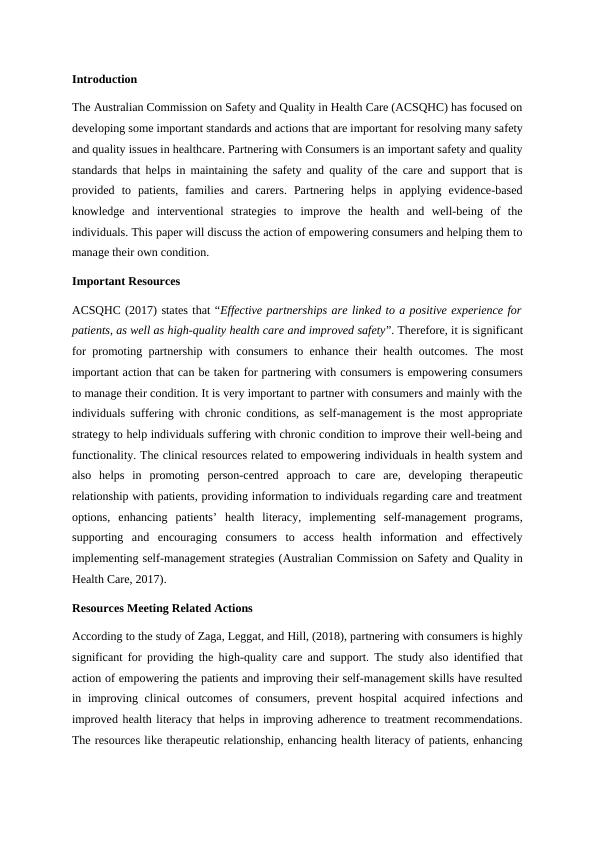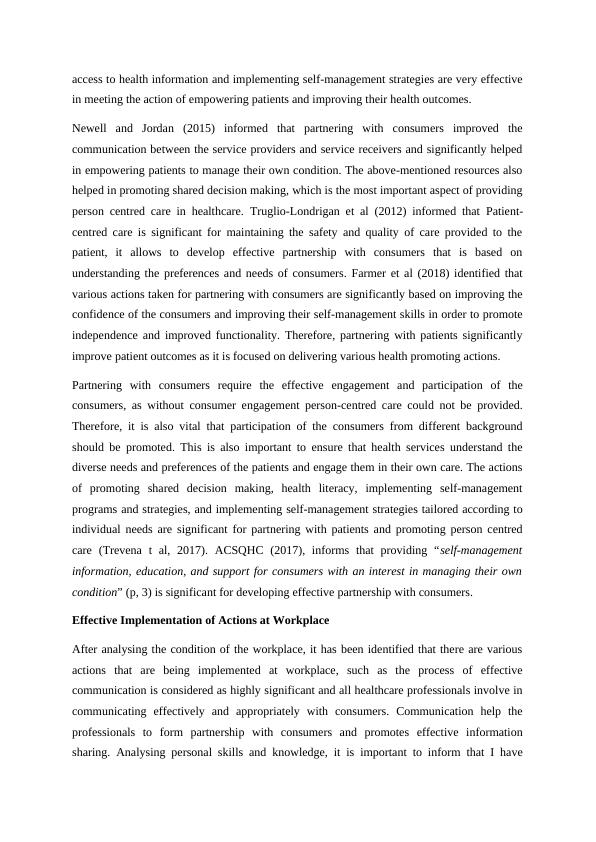Partnering with Consumers in Healthcare: Empowering Patients for Self-Management
Added on 2023-06-05
6 Pages1600 Words355 Views
Partnering with Consumers

Introduction
The Australian Commission on Safety and Quality in Health Care (ACSQHC) has focused on
developing some important standards and actions that are important for resolving many safety
and quality issues in healthcare. Partnering with Consumers is an important safety and quality
standards that helps in maintaining the safety and quality of the care and support that is
provided to patients, families and carers. Partnering helps in applying evidence-based
knowledge and interventional strategies to improve the health and well-being of the
individuals. This paper will discuss the action of empowering consumers and helping them to
manage their own condition.
Important Resources
ACSQHC (2017) states that “Effective partnerships are linked to a positive experience for
patients, as well as high-quality health care and improved safety”. Therefore, it is significant
for promoting partnership with consumers to enhance their health outcomes. The most
important action that can be taken for partnering with consumers is empowering consumers
to manage their condition. It is very important to partner with consumers and mainly with the
individuals suffering with chronic conditions, as self-management is the most appropriate
strategy to help individuals suffering with chronic condition to improve their well-being and
functionality. The clinical resources related to empowering individuals in health system and
also helps in promoting person-centred approach to care are, developing therapeutic
relationship with patients, providing information to individuals regarding care and treatment
options, enhancing patients’ health literacy, implementing self-management programs,
supporting and encouraging consumers to access health information and effectively
implementing self-management strategies (Australian Commission on Safety and Quality in
Health Care, 2017).
Resources Meeting Related Actions
According to the study of Zaga, Leggat, and Hill, (2018), partnering with consumers is highly
significant for providing the high-quality care and support. The study also identified that
action of empowering the patients and improving their self-management skills have resulted
in improving clinical outcomes of consumers, prevent hospital acquired infections and
improved health literacy that helps in improving adherence to treatment recommendations.
The resources like therapeutic relationship, enhancing health literacy of patients, enhancing
The Australian Commission on Safety and Quality in Health Care (ACSQHC) has focused on
developing some important standards and actions that are important for resolving many safety
and quality issues in healthcare. Partnering with Consumers is an important safety and quality
standards that helps in maintaining the safety and quality of the care and support that is
provided to patients, families and carers. Partnering helps in applying evidence-based
knowledge and interventional strategies to improve the health and well-being of the
individuals. This paper will discuss the action of empowering consumers and helping them to
manage their own condition.
Important Resources
ACSQHC (2017) states that “Effective partnerships are linked to a positive experience for
patients, as well as high-quality health care and improved safety”. Therefore, it is significant
for promoting partnership with consumers to enhance their health outcomes. The most
important action that can be taken for partnering with consumers is empowering consumers
to manage their condition. It is very important to partner with consumers and mainly with the
individuals suffering with chronic conditions, as self-management is the most appropriate
strategy to help individuals suffering with chronic condition to improve their well-being and
functionality. The clinical resources related to empowering individuals in health system and
also helps in promoting person-centred approach to care are, developing therapeutic
relationship with patients, providing information to individuals regarding care and treatment
options, enhancing patients’ health literacy, implementing self-management programs,
supporting and encouraging consumers to access health information and effectively
implementing self-management strategies (Australian Commission on Safety and Quality in
Health Care, 2017).
Resources Meeting Related Actions
According to the study of Zaga, Leggat, and Hill, (2018), partnering with consumers is highly
significant for providing the high-quality care and support. The study also identified that
action of empowering the patients and improving their self-management skills have resulted
in improving clinical outcomes of consumers, prevent hospital acquired infections and
improved health literacy that helps in improving adherence to treatment recommendations.
The resources like therapeutic relationship, enhancing health literacy of patients, enhancing

access to health information and implementing self-management strategies are very effective
in meeting the action of empowering patients and improving their health outcomes.
Newell and Jordan (2015) informed that partnering with consumers improved the
communication between the service providers and service receivers and significantly helped
in empowering patients to manage their own condition. The above-mentioned resources also
helped in promoting shared decision making, which is the most important aspect of providing
person centred care in healthcare. Truglio-Londrigan et al (2012) informed that Patient-
centred care is significant for maintaining the safety and quality of care provided to the
patient, it allows to develop effective partnership with consumers that is based on
understanding the preferences and needs of consumers. Farmer et al (2018) identified that
various actions taken for partnering with consumers are significantly based on improving the
confidence of the consumers and improving their self-management skills in order to promote
independence and improved functionality. Therefore, partnering with patients significantly
improve patient outcomes as it is focused on delivering various health promoting actions.
Partnering with consumers require the effective engagement and participation of the
consumers, as without consumer engagement person-centred care could not be provided.
Therefore, it is also vital that participation of the consumers from different background
should be promoted. This is also important to ensure that health services understand the
diverse needs and preferences of the patients and engage them in their own care. The actions
of promoting shared decision making, health literacy, implementing self-management
programs and strategies, and implementing self-management strategies tailored according to
individual needs are significant for partnering with patients and promoting person centred
care (Trevena t al, 2017). ACSQHC (2017), informs that providing “self-management
information, education, and support for consumers with an interest in managing their own
condition” (p, 3) is significant for developing effective partnership with consumers.
Effective Implementation of Actions at Workplace
After analysing the condition of the workplace, it has been identified that there are various
actions that are being implemented at workplace, such as the process of effective
communication is considered as highly significant and all healthcare professionals involve in
communicating effectively and appropriately with consumers. Communication help the
professionals to form partnership with consumers and promotes effective information
sharing. Analysing personal skills and knowledge, it is important to inform that I have
in meeting the action of empowering patients and improving their health outcomes.
Newell and Jordan (2015) informed that partnering with consumers improved the
communication between the service providers and service receivers and significantly helped
in empowering patients to manage their own condition. The above-mentioned resources also
helped in promoting shared decision making, which is the most important aspect of providing
person centred care in healthcare. Truglio-Londrigan et al (2012) informed that Patient-
centred care is significant for maintaining the safety and quality of care provided to the
patient, it allows to develop effective partnership with consumers that is based on
understanding the preferences and needs of consumers. Farmer et al (2018) identified that
various actions taken for partnering with consumers are significantly based on improving the
confidence of the consumers and improving their self-management skills in order to promote
independence and improved functionality. Therefore, partnering with patients significantly
improve patient outcomes as it is focused on delivering various health promoting actions.
Partnering with consumers require the effective engagement and participation of the
consumers, as without consumer engagement person-centred care could not be provided.
Therefore, it is also vital that participation of the consumers from different background
should be promoted. This is also important to ensure that health services understand the
diverse needs and preferences of the patients and engage them in their own care. The actions
of promoting shared decision making, health literacy, implementing self-management
programs and strategies, and implementing self-management strategies tailored according to
individual needs are significant for partnering with patients and promoting person centred
care (Trevena t al, 2017). ACSQHC (2017), informs that providing “self-management
information, education, and support for consumers with an interest in managing their own
condition” (p, 3) is significant for developing effective partnership with consumers.
Effective Implementation of Actions at Workplace
After analysing the condition of the workplace, it has been identified that there are various
actions that are being implemented at workplace, such as the process of effective
communication is considered as highly significant and all healthcare professionals involve in
communicating effectively and appropriately with consumers. Communication help the
professionals to form partnership with consumers and promotes effective information
sharing. Analysing personal skills and knowledge, it is important to inform that I have

End of preview
Want to access all the pages? Upload your documents or become a member.
Related Documents
Professional Nursing Practice: Partnering with Consumerslg...
|11
|3137
|194
Professional Nursing Practices Doclg...
|9
|2607
|45
Effective Communication and Health Literacy in a Culturally Safe Healthcare Environmentlg...
|10
|553
|423
(PDF) Quality and Safety in Health Care Managementlg...
|11
|2857
|23
Empowerment in Health and Social Care: Importance, Legislation, Factors, and Strategieslg...
|9
|2853
|388
Effective Communication and Health Literacylg...
|12
|2756
|324